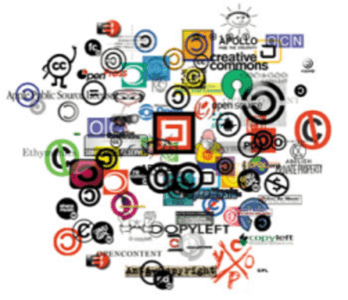Over the weekend, it seemed that everyone in the tech blogosphere contributed to the discussion around fractured blog comments; Robert Scoble even went so far as to say that the “era of blogger’s control” is over. What all these discussions hinged on was whether or not a web service called Shyftr had the right to appropriate bloggers’ RSS feeds and build their brand around our content (a practice they’ve now modified due to this outcry).

However, it’s not just bloggers who are dealing with the appropriation of our content, a practice whose implications imply that our words hold little value on their own. In fact, in today’s society, devaluation of content is becoming the norm.
It’s up to us to decide whether to fight this change or ride the wave.
The Value of a Blog
In a post entitled “What Are My Words Worth?“, blogger Steven Hodson worried about the devaluation of his brand, saying:
“We are being told that once we have written our posts we no longer have any say over what happens to them. In effect we are having to give up the vary basis of what gives our brand its very worth…So as we watch our pageviews and revenue streams decline because it’s now okay that the conversations can either be taken over by other services…It’s okay that someone else can build a brand off of our now non-important brand. It’s okay that any conversations over our original thoughts can take place anywhere because the home we have worked hard to build for our brand isn’t worth anything anymore.”
What this speaks to is a blogger’s fear that this type of shift will lead to a devaluation in a blogger’s brand. Effectively, their content is now the commodity that other services can utilize or exploit to build up brands of their own.
Content in Today’s Society
It’s not just bloggers whose content is being used, shared, and profited from today – perhaps now bloggers can begin to appreciate what other industries, like the recording industry or the movie-making industry, has had to face in this new digital age.

How did it come to this? Jonathan Handel, a digital media, entertainment and technology lawyer posts on his blog about the nature of content in today’s society.
He sees six reasons for content’s devaluation(to paraphrase):
- Supply and Demand: The supply of online content has grown enormously in the past decade, including user-generated content, a bunch of which includes content created by people who don’t care if they get paid for its creation.
- Loss of Physical Form: When you steal an object (like a DVD, for example), you deny it to the owner. When you “steal” a movie, by downloading it, it’s still there for others to use. Its intangible nature makes its appropriate feel much less like stealing.
- It’s Easy: Getting content from the internet is far easier than through traditional methods.
- New Media is Ad-Supported: The “freemium” model makes content available at no cost to the user – so why should the user see the content as valuable?
- Market Forces: Computers and web services are more valuable when more content is available, and non-professionals flock to use the new technologies of the web, as they had long been denied access to distribution via traditional methods.
- Culture: A generation of users has grown up indifferent or even hostile to copyright.
What It All Means
What this means for us as bloggers and new media creators is that the very technologies that we have grown to love are the same forces that are turning our efforts, be them our words, our videos, our music, our photos, or anything we create, into a commodity – something that has little monetary value on its own, but in aggregate, can become something of value.

Case in point: iTunes. Individually, the songs are inexpensive, but by combining them and providing the downloading service, iTunes rules the digital music landscape – something old media is not fond of. Take NBC Universal’s Jeff Zucker and his infamous railing against Apple as being a corrosive force in the media business: “We don’t want to replace the dollars we were making in the analog world with pennies on the digital side.”
We may have scoffed at his concerns at the time, but now, bloggers are feeling those same forces at work on our own content, as it gets sucked into other services, making our individual contributions nothing more than a droplet in the stream that is new media.
However, we can’t on the one hand support the commoditization of other media – happy to download music either via P2P or for pocket change and cry when DRM restricts its copying – and then, at the same time, purport that our very own creations, like our blog posts, or even more absurdly, the comments around those posts, have some sort of value that is above and beyond them becoming commodities as well.
Other Impacts
Handel also comes to the conclusion that the abundance of content is not necessarily good for users. “When everyone’s a creator, there’s less room for high-quality professional content,” he says.
While it may seem like there is less room for high quality content, I would argue that there’s still just as much room, it’s just harder to find the best stuff because it’s mixed in with the rest. Information overload, you could call it.
That’s why services that can help you find quality content, whether an RSS recommendation service like Toluu, or a recommendation-based search engine like the upcoming Delver, will be the next-gen tools for the digital age.
Conclusion
As media creators and consumers, we have to realize that content is a commodity now – it’s too late to fight this trend, so we need to just make the best of it.

I think Mark Evans hits on a good idea on his post “Shyftr’s Lessons for Bloggers” saying that if it’s so important to you that your blog retains value of its own, then make it a destination:
“Use cool widgets, blog asides, newsletters, polls and, of course, a user-friendly design. Whatever it takes to convince people that visiting your blog is worth it can only be a good thing.”
Agreed. Without some sort of interactivity or blog-only content, readers will find themselves consuming your content off-site more than ever in the coming days.
All that’s left to decide is where you stand. Should information (even yours!) be free? Is your motto “steal my content, please?” Or will you fight this disruption and try to cling to the old model like the RIAA and MPAA did? Or maybe you think there is still some middle ground to be had. Let us know your thoughts in the comments.

















